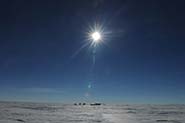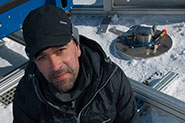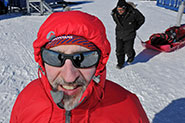For the past three years a team of engineers from the British Antarctic Survey (BAS) and the National Oceanography Centre (NOC) have pushed the boundaries of polar technology to design and build a state-of-the-art titanium water-sampling probe and a bespoke sediment corer capable of being lowered down a three kilometre borehole in the ice made by a custom-built hot-water drill. To add to the challenge every piece of technology has to be sterilised to space industry standards to ensure this unexplored lake remains pristine.
More videos on Lake Ellsworth's YouTube channel.
After setting up the science camp and preparing all the equipment to start the mission, the team will have just 24 hours to sample the lake before the borehole re-freezes and re-seals the lake. Typical working conditions will be in temperatures a chilly minus 25°C and wind speeds averaging 25 knots.
For regular updates on the team's progress, visit the Lake Ellsworth blog.
Academic profiles
Three academics from the University of Bristol's School of Geographical Sciences are part of the Lake Ellsworth project. Principal Investigator, Professor Martin Siegert and aquatic biogeochemist Professor Martyn Tranter arrived at the drill site in Antarctica on 4 December. Some of the water samples retrieved will be analysed back in Bristol next year by biogeochemist Professor Jemma Wadham.
Professor Martin Siegert
Martin Siegert is Professor of Geosciences in the University of Bristol's School of Geographical Sciences. He is the Principal Investigator on the NERC Consortium Grant award and Chair of the subglacial Lake Ellsworth Steering Committee and Programme Board.
He initiated the subglacial Lake Ellsworth programme, gathered the consortium of members, led the NERC application and oversaw its development through advice from the Programme Manager Chris Hill.
He has been involved in subglacial lakes research for over 15 years and has been to Antarctica twice before, including the Lake Ellsworth site as part of the Chilean expedition in January 2006.
Professor Siegert said: "The two main science questions (is there life in subglacial lakes? Are there climate records within the lake floor sediments), and all the questions that will follow from them, are fundamental and profound. Personally, I feel hugely proud of everyone involved in the consortium - to lead such a programme is a genuine and unique privilege."
Read more about Professor Martin Siegert
Professor Martyn Tranter
Martyn Tranter is Professor of Geography at the Bristol Glaciology Centre, School of Geographical Sciences, University of Bristol
He is leading the part of the subglacial Lake Ellsworth project that will retrieve and analyse water samples from the lake. The water will be tested to see if microbial life is active biogeochemically beneath Antarctica. He will also conduct some simple experiments on the mud on the lake floor to see how chemically reactive it is, and how much solute it can provide to the lake over time. From this, it will be possible to work out how quickly water flows through the lake.
He has been to Antarctica five times, working with the National Science Foundation’s Long Term Ecological Research Program in the McMurdo Dry Valleys where Scott trained prior to his last Antarctic expedition
Professor Tranter said: "This is just about the tops for me scientifically. It would mean the same to me as if Wolves won the Champions League and the Premiership three seasons on the bounce. I’ve been researching glacier meltwater chemistry all my professional life, and I have been predicting life in subglacial lakes for some time, so to be part of the team that actually shows this is the case would be mega."
Read more about Professor Martyn Tranter
Professor Jemma Wadham
Jemma Wadham is Professor in Glaciology at the Bristol Glaciology Centre, School of Geographical Sciences, University of Bristol.
She is working with Professor Martyn Tranter on the analysis of water samples from Lake Ellsworth and has been researching how microbial life leaves a fingerprint on subglacial waters.
Read more about Professor Jemma Wadham
Previous press releases
- British team embark on ambitious Antarctic mission
5 December 2012 - British team set to embark on ambitious Antarctic mission
7 September 2012 - Engineering team heads to Antarctica to explore hidden lake
11 October 2011 - Exploration of buried Antarctic lake given green light
2 March 2009 - The exploration of Lake Ellsworth: an Antarctic subglacial lake
20 December 2004 - Is there life in lakes under glaciers?
13 October 2003


